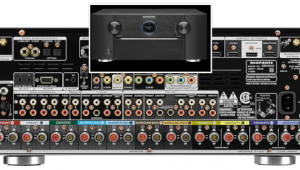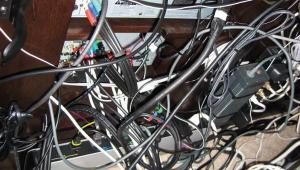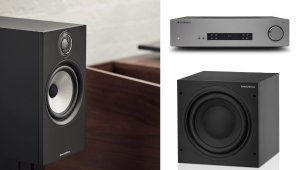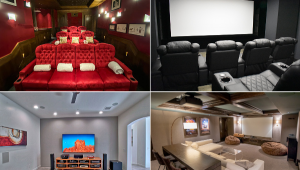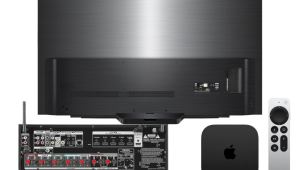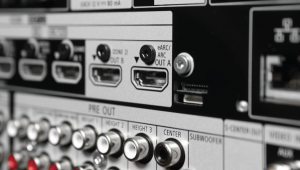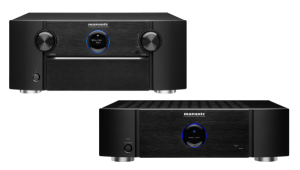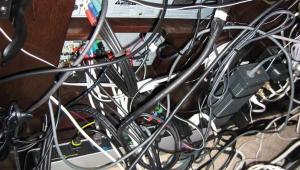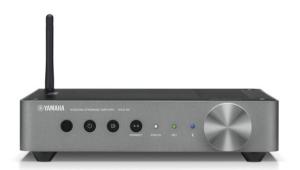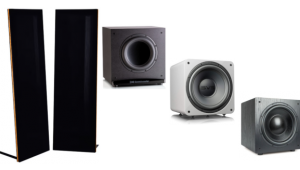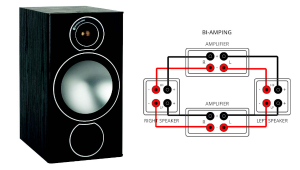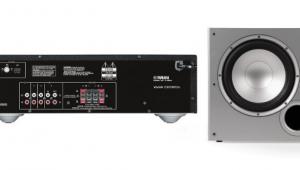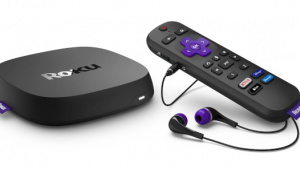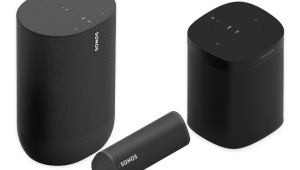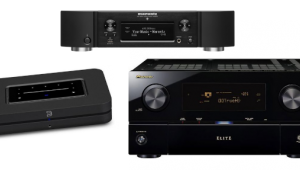Speakers: Boston A25 for front left/right and surround, Boston A225c for center channel and Boston ASW250 subwoofer
Receiver: Denon avr 1912
blu ray player: Panasonic dmp bdt220 (2012 model)
HDTV: Panasonic 50st50 (2012 model)
To Keep or Not to Keep Bose 401 Speakers

Currently, I'm considering the Pioneer VSX-1021 or Onkyo TX-SR609 AVR and the Samsung BD-D6700 Blu-ray player. After that I have no idea what to do. What subwoofer, center channel and surround sound speakers do I buy to go with the Bose 401s? Perhaps the Bose 161s? Or do I just forget it and buy a complete speaker system? If so, which one?
Brent Gardner
First of all, I must say that I'm not a fan of Bose speakers—their reputation has more to do with marketing hype than performance in my opinion. Plus, Bose doesn't make a dedicated center-channel speaker as far as I can tell from its website. Finally, the 401s must be positioned rather carefully in the room, which might or might not work in your theater layout. If you like the 401s, I'd recommend setting up a separate 2-channel music system with them in a room that can accommodate their direct/reflecting operation.
You don't need to spend a bundle on new home-theater speakers. I strongly recommend the Pioneer SP-PK21BS, a complete 5.1 compact-speaker package that performs way beyond its $400 price. If you can spend a little more, the SP-PS51FS package (shown above) includes two floorstanders like your 401s for the front left and right positions for a list price of $519. Either way, these speakers are a killer value.
Your picks for AVR and Blu-ray player are all excellent. If you use Apple products as A/V sources, I recommend the Pioneer AVR, which provides AirPlay support, and its auto-setup routine includes the subwoofer, which the Onkyo's does not. The Samsung BD-D6700 is a fine Blu-ray player, though I've heard of some reliability issues that didn't come up in our review. A good alternative is the Panasonic DMP-BDT210, which is even less expensive than the Samsung 6700.
After that, all you need is a TV, and you're all set. If you want 3D, I recommend the Panasonic ST30 line, but if 3D is unimportant to you, the S30 is essentially identical without 3D capabilities. Get the largest screen size you can afford—the 50-inch versions of both lines can be found for well under $1000.
If you have an A/V question, please send it to askhometheater@gmail.com.
- Log in or register to post comments


I would just add that out of all the items you will be purchasing, your speakers will probably last you the longest. Typically, you will probably want a new AVR in 5-6 years, probably the same amount of time before you will be wanting a new TV. You will probably get a new source (Blu-Ray or whatever digital download system/app store) in just a couple years. Speakers, however, sometimes get 10, 15 or even 20 years of life before being replaced!
All of the recommendations above from Scott are valid, and I would not hesitate to second his thoughts on the gear, BUT...if you can put a little more into your speakers, that investment will carry forward for many years. Have fun...and remember, shopping and assembling your theater is half the fun!

Quote: "Speakers, however, sometimes get 10, 15 or even 20 years of life before being replaced!"
I have a pair of Advent 5002's which are 29 years young! I re-foamed them 3 or 4 years ago and I wouldn't trade them for anything. I use them daily in my home theater and I have matched them with Cambridge Sound Works Model 18 surrounds. I also have a pair of AR 4X's which will be my next restoration project. They are 45 years old and except for a bad tweeter, they still work. They were all designed by the late Henry Kloss, the father of acoustic suspension. Just my 2 cents, but he knew how to make speakers lol.
Ian

This question brings up something I have been wondering about for quite some time. It's a little off topic, so please excuse me.
If I am not mistaken, the Bose 401's are 4 Ohm speakers. (If not, for the sake of my question, let's please say they are.) If the person were to try and add speakers and use the 401's, would he have to stay with all 4 Ohm speakers? I guess I am wondering/curious if you can mix and match speakers of different impedance connected to the same AVR. Right now I have a nice set of Yamaha 6 Ohm speakers, but if I ever wanted to tinker with my system, I wanted to know if I have to be careful to keep everything the same regarding resistance. Could I mix 6 Ohm and 4 Ohm, or 6 Ohm and 8 Ohm, probably not all three - right?
Thanks,
Mark, from Upstate New York
or, recently referred to as "Son" by HT Mag :-)

Everyone here is an expert, apparently. There are fundamental questions not addressed in your post: such as... are you in a condo or detached house, room size, is it a dedicated theater room or multi use room, carpet or hardwood, glass, drywall, furnishings, and maybe most important: does your room offer sufficient room to move speakers around - even a few inches here and there can make a difference. I agree with your picks for peripherals (blu-ray player, AVR , etc., and Scott's alternatives...but audio is another matter - and that's where it gets personal - your ears are the only judge which matters. Ian with his Advents, me with my Genesis II's have been successful at matching tonal quality (timbre) but, personally I wouldn't attempt a mix and match with Bose unless you want to try the Bose 401's with three Bose Wave Radios as the center channel and surrounds. Recommendation: start over.

I fight this battle with my dealers all the time, especially when it comes to center channels! (they always want to buy the smallest possible center channel, regardless of what the customer is currently using for the main left and right channels!)
You have a quality to each speaker called timbre. Timbre is the tonal quality of the speaker. Each brand of speaker uses different speaker drivers, different crossovers, and different enclosures (material and construction). Each of these choices affects the overall sound of the speaker. You may find that a certain brand is "brighter" than another (it has a crisper, more defined sound in the upper midrange and high end frequencies), or it might be "warmer" in certain areas. All speakers will color the sound one way or another...but you will almost never find two speakers that color the sound the same way!
With a good surround sound setup (with matching speakers), you will be in the middle of a continuous field of sound. Sounds that move around the room will blend seamlessly from one speaker to another, moving evenly between each speaker. You should be able to close your eyes and not be able to pinpoint where each speaker is in the room by hearing alone...the speakers should "disappear". This dissapearing act is what adds to the immersion when you are watching a movie. If the system is doing it's job well, you are paying attention only to the movie, NOT the sound system!
If the speakers are mismatched however, the sound will "jump" from speaker to speaker. You will be able to tell when the sound moves from the left speaker to the center channel, and over to the right speaker. Or when it moves from the front speakers to the rear channels. This will pull your attention away from the movie you are watching...your brain will notice the shifts in sound, and all of the sudden, you are no longer "in the movie", you are paying attention to the speakers and how the sound is moving around in the room!
You can avoid all of these problems by starting fresh. Don't be tempted to recycle old speakers just to save a few dollars! The old speakers are still good, however! Take your Bose speakers and plop them down in another room, maybe in just a 2 channel stereo configuration. That way, you get to keep enjoying your existing speakers, you bring music into another room in your house, and you can make sure you have the best sound possible for your home theater!

The Pioneer SP-PK21BS would be a great choice and definitely a leader in the value/$.
An even less expensive option is the Onkyo SKS-HT540 7.1 speaker set. MSRP of about $350 but it can be had for under $250 shipped! Even if you just use 2 of the 4 surrounds with a 5.1 system, it is still a great value...
If you can stretch for a slightly more expensive option compared to the Pioneer's, I'd suggest taking a look at Infinity's Primus line. They won't win any beauty contests (neither will the Pioneers nor the Onkyos for that matter) but they sound great for the money. You can buy a set (I think they have a 5.1 set) or build your own with any combination of Primus speakers to fit your needs.
Any of the three options would be a good choice, it just depends on the budget you want to commit to. Good luck and remember, there will always be better speakers out there but don't worry about them...just pick a good value within your price range (check the "Top Picks" section for more great options) and spend a little extra time setting it up correctly and tweaking it to suit your unique listening environment. Most receivers come w/an auto setup these days - take the time to run it

Put the 401s away or sell them. I used to own a pair of those and the 301s. For Bose, the 301s weren't bad; they had a pleasing midrange. The 401s have no midrange to speak of. They use the same drivers as the accoustimass series. Once you buy one of the speaker setups mentioned above you can compare them and then never look back.

